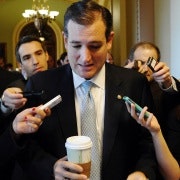FT.com
George W Bush was supposed to have said: “The problem with the French is they don’t have a word for entrepreneur.” Unfortunately he never said it (though he really should have). Today’s Washington is also ambivalent about the French word. In a bitterly gridlocked town, every politician still pays lip service to small businesses. Yet by turning a blind eye to the needs of struggling entrepreneurs, the town is conniving in their declining fortunes. President Barack Obama would help his embattled presidency and the US economy if he embraced the cause of America’s entrepreneurs.
The rate of small business creation in the US is in long-term decline. Last year just 513,000 businesses were created, down from 543,000 in 2011. Overall, businesses under five years old account for just 8 per cent of US businesses, against 13 per cent in the 1980s, according to the Kauffman Foundation. Would-be entrepreneurs are hampered by a litany of problems. The US tax system gets ever more complex, which favours large companies that can afford to hire lawyers to navigate their way through it. The same applies to federal regulations, whose growing complexity benefits large corporations. Most large pieces of US legislation should be subtitled: The Full Employment for Accountants and Lawyers Act.
Access to credit is even more skewed. In spite of the length of the US recovery, the volume of lending to US small businesses keeps falling. According to the Small Business Administration, last year lending fell by $19 billion to $587 billion – a fifth below pre-recession levels. Washington’s regulatory grip on those banks that still lend to small businesses – America’s community banks – keeps getting tighter. According to Tom Hoenig, vice-chairman of the Federal Deposit Insurance Corporation, the effective equity cushion at the largest US banks is between 4 and 6 per cent of their balance sheet. For the small Main Street banks that still make ‘character loans’ – lending money to customers they know – that cushion is 9 per cent. In other words, US regulators are twice as strict with those banks that are least likely to pose a risk to the system.
Washington is also structurally rigged against entrepreneurs. By definition, future businesses have no lobby group to advance their interests on Capitol Hill. In contrast, big businesses get the pick of the crop. When he was campaigning for the Republican presidential nomination in 2011, Tim Pawlenty, the former governor of Minnesota, said his message to Wall Street would be: “Get your snouts out of the trough.” Today he is paid at least $1.8 million a year to lobby for Wall Street as president of the Financial Services Roundtable. His salary is roughly half the total annual Washington spending of America’s 7,000 community banks. “In a typical year you would find a JPMorgan or Goldman Sachs would alone spend more in Washington than we do,” says Camden Fine, president of the Independent Community Banks of America.
The big regulators – the US Federal Reserve, FDIC and the Office of the Comptroller of the Currency – have shown great forbearance to the large Wall Street banks, which get an implicit “too big to fail” subsidy of about $75 billion a year. In contrast, they have made it almost impossible for community banks to leverage their own greatest resource – knowledge of their customers. “Washington is regulating local relationship banking out of existence,” Fine says. In 1994, community banks accounted for 38 per cent of all US bank assets. Today its share stands at less than half that.
Republicans and Democrats alike shed a tear for the demise of the Main Street bank while pocketing donations from the big boys. Obama is no exception. Here are two reasons why he should nevertheless take up the cudgels on behalf of entrepreneurs and those who want to fund them.
First, what the president is doing now isn’t working. Last week Obama went on the road for the nth time to campaign for the US middle class. Most of his ideas, such as boosting infrastructure, are good. But none stands a chance of passing this Congress. Instead of repeating the same thing over and over and praying it will go differently, Obama should take a risk. The effective tax rate for big US businesses is 12.6 per cent but nearer 35 per cent for small businesses. Obama should campaign to lower the headline rate, raise the effective one and put accountants and lawyers out of a job. He could call it the Entrepreneurs Dream Act. Since it would go to the heart of what it is to be American, the debate would put the Republicans on the defensive.
Second, making things easier for entrepreneurs is another way of reaching the economic goals that are eluding Obama. Most jobs are created by small businesses and they are also the source of most innovation. Today’s Washington is as beholden to big business and big banks as it has ever been. There is a deep – but hibernating – strand of trust-busting populism in US politics. Great Americans such as Teddy Roosevelt and Justice Brandeis were about the people versus the plutocrats. They were also about competition– boosting capitalism rather than capitalists. It is long past due to revive that distinction in US politics. At this troubled stage in Obama’s second term, it might be just what he needs to get out of his cul-de-sac. Come to think of it, the French have a word for that too.
Copyright The Financial Times Limited 2013.
















